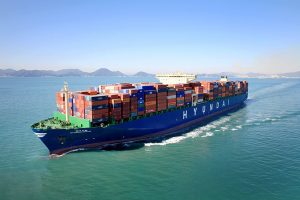

Picture: Shipping21 Hyundai Merchant Marine Dream container ship
As of today (March 30, 2017), the Federal Maritime Commission’s (FMC) approval of the cooperation agreement between Hyundai Merchant Marine (HMM) and the 2M alliance members, Maersk and MSC is effective.
Remember when less than a year ago it looked like HMM was headed for receivership? Yeah, I didn’t think you’d forgotten. That memory, combined with Hanjin Shipping’s collapse, has shippers a little worried.
When Hanjin collapsed, many shippers found that their cargo was stuck on the bankrupt carrier’s ships even though they hadn’t contracted with Hanjin. Hanjin’s carrier alliance partners placed cargo on Hanjin ships without shippers’ knowledge. Of course, carrier alliances are vessel sharing agreements, so cargo from carrier alliance partners on Hanjin’s ships really should have been no big surprise.
Still, that fallout was both surprising and costly for many shippers.
Shippers now worry something similar may happen again. Could it happen with this Maersk, MSC, HMM agreement? Remembering HMM’s financial troubles has made shippers wary of Maersk and MSC’s agreement to enter a strategic cooperation agreement with the South Korean carrier.
There are a few things that may help make shippers feel better about this deal.
Here are three things to help allay shippers’ fears about HMM’s agreement with the 2M members:
1. HMM Is Not Joining 2M
It might seem like a matter of semantics, but this agreement is not between HMM and the 2M Alliance; it’s between HMM and the 2M alliance’s members.
In a short World Maritime News article about FMC Commissioner William P. Doyle giving his vote for approval of the agreement, the commissioner was quoted as saying:
“Despite announcements that were issued in mid-December by Maersk, MSC and HMM, the 2M alliance itself is not party to this strategic cooperation agreement. For clarification, the term 2M generally applies to the FMC filed agreement known as the Maersk/MSC Vessel Sharing Agreement.”
The distinction between this being an agreement between HMM and 2M partners, Maersk and MSC and not being an agreement with the 2M Alliance itself is significant. This agreement is more specific with the carriers purchasing slots on each other’s ships on selected routes rather than sharing ship operations through various shipping lanes in general.
What this higher selectivity of cooperation in cargo shipping creates is less exposure of risk to Maersk and MSC and, by extension, their shippers.
2. No Cargo On HMM Ships Without Shippers’ Knowledge
Like shippers, the FMC has not forgotten HMM’s financial struggles and the fallout of Hanjin’s collapse. An article on the Loadstar by Mike Wackett about the FMC greenlighting the agreement pointed out that the commission did so “with a proviso on shipper safeguards.”
The article emphasized Maersk’s commitment not to load cargo onto HMM without shippers’ consent:
Commissioner William Doyle said: “Maersk confirmed this week it would honour its commitment to shippers as to having a say on the vessels their cargo will be loaded onto….”
… Maersk said 2M cargo would only be loaded onto HMM vessels “with customers’ express agreement”.
That Maersk said 2M cargo rather than Maersk cargo makes it sound as though the carrier is speaking for MSC as well. However, shippers shouldn’t make that inference. MSC’s commitment, as related by the Loadstar article, does not seem to include customer consent, only transparency:
“MSC’s statement provided no shipper option to exclude carriage on the HMM services,” [said Commissioner Doyle.]
However, MSC subsequently told The Loadstar: “We have responded to the FMC regarding their concerns, and we are pleased that the agreement has now been approved.
“MSC is committed to providing shippers clear and transparent communications, including when slot purchases, exchanges or VSA’s are involved.
“It will normally be apparent to customers when the booked vessel is not a MSC vessel, and we will always do our best to keep customers informed if vessel is changed.”
MSC providing transparency when it comes to shipping on HMM versus 2M vessels is good and will help allay shippers’ fears some. Maersk getting consent before shipping on HMM ships is even better.
3. HMM in Much Better Position Than a Year Ago
I don’t want to go so far as to say HMM is the picture of financial health or is even financially strong. However, the carrier is looking much stronger than a year ago.
Of course, that in itself isn’t saying much. A year ago, HMM had a lot of work to do to avoid receivership. However, avoiding receivership did take some doing and show some resilience from the carrier.
Not only did HMM manage to stay out of receivership by getting a debt-for-equity deal from its creditors and reduced charter fees, but the demise of Hanjin also strengthened HMM.
South Korea had two big, state-owned carriers in Hanjin and HMM, but now HMM is THE big, state-owned carrier of South Korea. The market share benefit of that should be obvious, but this should also make it more likely that the South Korean government would help HMM avoid a financial collapse, like that of Hanjin’s, in the future.
Discover more from reviewer4you.com
Subscribe to get the latest posts to your email.






